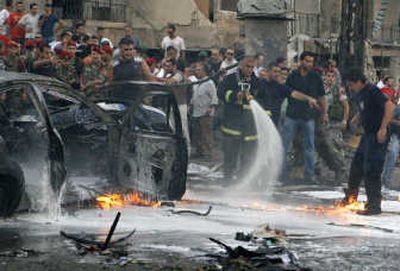Lebanese politician slain in bombing

BEIRUT – In what is becoming a worryingly familiar event in Lebanon, a massive car bomb killed an anti-Syrian member of parliament Wednesday, just days before parliament was due to meet to elect a new president
Antoine Ghanem, 64, died along with his driver, another passenger in his car and at least six other bystanders in the rush-hour blast, which ignited several vehicles and damaged apartments for blocks around in the Christian Sin el Fil neighborhood of Beirut.
The explosion came six days before a scheduled special session of the nation’s parliament for the election of a new president, prompting allegations from supporters of the pro-Western government that Syria is systematically seeking to eliminate anti-Syrian legislators to deny the government a majority.
Ghanem’s death reduced the number of pro-government parliamentarians to 68, a majority of just four in the 128-seat legislature.
“The only way to reduce our majority … is through assassinations,” Druze leader Walid Jumblatt, a leading member of the parliamentary majority, told Al-Jazeera television. He accused Syrian President Bashar Assad of complicity.
“He still has to kill four more of us in order to say to the Lebanese people: You won’t vote for an independent president,” Jumblatt said.
Ghanem was the third member of parliament to be assassinated in the past 10 months and the eighth member of the anti-Syrian March 14 movement to be killed since the February 2005 assassination of former Prime Minister Rafiq Hariri split the country into pro- and anti-Syrian camps.
Fearing for his life, Ghanem had reportedly spent the summer abroad, returning to Lebanon just two days earlier. He was a member of the same Christian Phalangist party as Pierre Gemayel, who was assassinated in November last year. In the most recent killing in June, Sunni parliamentarian Walid Eido died in a similar bombing.
Syria denied it had anything to do with the bombing.
The attack sent tensions soaring between the two sides and seemed certain to diminish prospects that the divisions will be healed in time to elect a president in the near future.
With the country bitterly divided between the rival pro-Western government and the opposition, supported by Iran and Syria, it was already in doubt whether Tuesday’s planned session would be held. Parliament has not met since October, shortly before a walkout by Hezbollah and Shiite Amal ministers paralyzed the government.
The term of the current, pro-Syrian President Emile Lahoud expires Nov. 24.
The March 14 movement, which groups some Christians, Sunnis and Druze, had so far refused to accept an offer by the Shiite speaker of parliament, Nabih Berri, to agree to elect a president by a two-thirds majority, in return for the opposition dropping demands for a new government.
Though there are still two more months for the two sides to try to bridge their differences, this latest bombing is likely only to further deepen the divide.
If no replacement is chosen by Nov. 24, Lahoud has said he will appoint a new administration, raising the specter that Lebanon will have two rival governments and perhaps slide closer toward the civil war everyone fears.